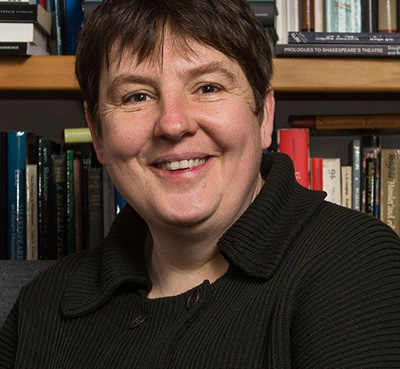Myths about Shakespeare
Professor Emma Smith (Hertford College, Oxford)
Monday 15 January, 6.00 pm - White Swan
Emma Smith is Professor of Shakespeare Studies at Hertford College,
Oxford, and the author of numerous works on Shakespeare including, This Is
Shakespeare and, with Laurie Maguire, Thirty Great Myths about
Shakespeare. She lectures widely, is an Associate Scholar at the RSC, and
is a contributor to radio and tv programmes.
Emma will test out some of the myths about Shakespeare, for example,
that he wrote to please the Queen, that he acted the role of Hamlet’s father,
or that there is nothing new to be said about his works. She will assess how
much truth there is in these and similar widely held beliefs, and also talk about why these myths are so perennial.
Watch the presentation here (starts 3 mins in).
A large audience was entertained and hugely informed regarding the likely truths about the myths about Shakespeare. Emma’s first point was regarding his vocabulary. It seems that it was not anywhere near as large as we think. We use far more words. Secondly, it is also believed that Shakespeare invented many new words. It is more likely, from research into others’ works, that he merely made some words better known. He was, however, inventive in his use of words, in different contexts.
Personal life: it is believed that he had a poor relationship with his wife, Anne Hathaway. The evidence of his will – that he left her only his ‘second best bed’ – does not prove that, as this bed would have been their bed, the ‘best bed’ being for guests. A will is a formal document and does not reflect emotion. Anne is also not mentioned elsewhere in the will. His absences in London, and the fact that they had only three children, are also cited as evidence for a loveless marriage. However, Anne made the connection for Shakespeare with a playwright called Hathaway in London, so she may have actually helped him.
Some also say that Anne, an older woman, ‘lured’ him into marriage by becoming pregnant, but this circumstance was not unusual! In Shakespeare’s plays there are also several worldly-wise women wooing younger men! Perhaps, in biographies of famous men, it made a better story to have an unworthy wife in the shadows! (Will in the World: How Shakespeare became Shakespeare by Stephen Greenblatt and Shakespeare’s Wife by Germaine Greer were both mentioned by Professor Smith.)
Professional life: Shakespeare certainly acted as Hamlet’s father and as Old Adam, but we know little about his role as a performer. Biography writing was not that common then, so there is little evidence. In 1709, Nicholas Rowe produced new editions of Shakespeare’s plays, illustrated in the fashions of his times. He gathered some biographical material but much may have been made up. He also attributed minor roles to Shakespeare but considered him to be, essentially, a poet - not a lowly actor! Rowe also thought that the rude humour in the plays was for the groundlings only.
Shakespeare may have performed in Ben Jonson’s plays and also with the Chamberlain’s Men. We do not know for sure, but Paul Menzer in William Shakespeare: A Brief Life suggests that he wrote at night as he was acting in the afternoon. There is also evidence that Shakespeare organised his plays for the ease of actors playing multiple parts, due to his own knowledge. Shakespeare’s plays would have been in repertory with other writer’s plays and no-one worked in isolation.
Who wrote Shakespeare? The myth that Shakespeare’s did not write his works is mainly a 19th. century idea. The ‘authorship question’ has much class bias in it. Surely only a nobleman could have done it! There are other theories – that Shakespeare was a woman (eg, see Elizabeth Winkler’s book, Shakespeare was a Woman and other Heresies, and the belief that he might just have been a genius seems to have been hard to accept. These things are hard to prove, so the theories go on.
In conclusion, collaborative working is now accepted as a reasonable idea, and new works are being attributed to Shakespeare using Artificial Intelligence techniques.










